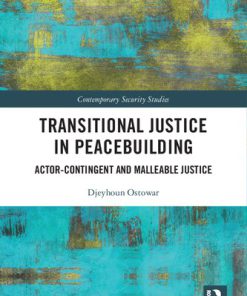Violence Law and the Impossibility of Transitional Justice 1st Edition by Catherine Turner 1317441397 9781317441397
$50.00 Original price was: $50.00.$25.00Current price is: $25.00.
Violence Law and the Impossibility of Transitional Justice 1st Edition by Catherine Turner – Ebook PDF Instant Download/Delivery: 1317441397, 9781317441397
Full download Violence Law and the Impossibility of Transitional Justice 1st Edition after payment
Product details:
ISBN 10: 1317441397
ISBN 13: 9781317441397
Author: Catherine Turner
The field of transitional justice has expanded rapidly since the term first emerged in the late 1990s. Its intellectual development has, however, tended to follow practice rather than drive it. Addressing this gap, Violence, Law and the Impossibility of Transitional Justice pursues a comprehensive theoretical inquiry into the foundation and evolution of transitional justice. Presenting a detailed deconstruction of the role of law in transition, the book explores the reasons for resistance to transitional justice. It explores the ways in which law itself is complicit in perpetuating conflict, and asks whether a narrow vision of transitional justice – underpinned by a strictly normative or doctrinal concept of law – can undermine the promise of justice. Drawing on case material, as well as on perspectives from a range of disciplines, including law, political science, anthropology and philosophy, this book will be of considerable interest to those concerned with the theory and practice of transitional justice.
Violence Law and the Impossibility of Transitional Justice 1st Table of contents:
1 Introduction
1.1 What is ‘transitional justice’?
1.2 Aim of the book
1.3 Northern Ireland: a conflicted democracy
1.4 Outline of the book
2 Transitional justice: the constitution of the field
2.1 Establishing the ‘field’
2.1.1 The law and politics of transition
2.1.2 Transitional justice and the rule of law
2.2 Transitional justice: the margin and the mainstream
2.2.1 The emergence of the transitional justice norm
2.2.2 Transitional justice and opposition
2.3 Transitional justice and critique
2.3.1 Internal critique and the boundaries of ‘transition’
2.3.2 External critiques and the meaning of ‘transition’: truth and reconciliation
2.3.3 Transitional justice and the ideology critique
2.4 Conclusion
3 Introducing uncertainty: deconstruction and transitional justice
3.1 What is deconstruction?
3.1.1 Logocentrism
3.1.2 Nothing beyond the text
3.1.3 ‘Différance’
3.2 Deconstruction ‘happens’
3.2.1 Deconstruction is not a method
3.2.2 Deconstruction is not critique
3.2.3 Deconstruction is not an act
3.2.4 Deconstructing transitional justice
3.3 Law and deconstruction
3.3.1 Axiomatic propositions of law
3.3.2 The ‘essentially deconstructible’ nature of law
3.3.3 Law as the means to justice (or why deconstruction is a valuable approach to transitional justice)
3.4 Conclusion
4 Violence
4.1 The economy of violence
4.1.1 The violence of the origin
4.1.2 Reparatory violence (on the obliteration of the origin)
4.1.3 The violence of reflection
4.2 Contested narratives and the turn to violence
4.2.1 Legitimate ‘force’ and illegitimate ‘violence’
4.2.2 The mythic state and the divine terrorist
4.2.3 ‘Emergency’ as an ‘exceptional’ state of affairs
4.3 The mutual contamination between violence and law
4.4 Conclusion
5 Law
5.1 The violence of the origin
5.1.1 Shifting means of resistance: the Armalite and the ballot box
5.1.2 Framing the Agreement
5.1.3 The Agreement as a constitutional moment
5.1.4 Declaring or creating unity?
5.2 Concealing the violence of the origin
5.2.1 Northern Ireland in ‘transition’
5.2.2 Dominant and subordinate accounts of conflict
5.2.3 Litigating the Agreement (and concealing the violence of the origin)
5.3 The violence of reflection – flags, parades and the past
5.3.1 Flags
5.3.2 Parades
5.4 Conclusion – the hierarchy inverted
6 Justice
6.1 What is transitional ‘justice’?
6.1.1 How is ‘justice’ defined?
6.1.2 How is ‘justice’ achieved?
6.2 Law and justice
6.2.1 First aporia: the rule
6.2.2 Second aporia: ‘the ghost of the undecidable’
6.2.3 Third aporia: ‘the urgency that obstructs the horizon of knowledge’
6.3 Conclusion: justice ‘to come’
Conclusion: the impossibility of transitional justice?
1. The importance of critique in transitional justice research
2. Transitional justice as autoimmunity
3. ‘Impossible’ is not the opposite of ‘possible’
Bibliography
Index
People also search for Violence Law and the Impossibility of Transitional Justice 1st:
transitional justice examples
transitional law
transitional justice definition
transitional justice processes
Tags:
Catherine Turner,Violence Law,Impossibility
You may also like…
Society Politics Philosophy Anthropology
Society Politics Philosophy Social Sciences
Politics & Philosophy - Government & Politics
Business, Human Rights and Transitional Justice 1st Edition Irene Pietropaoli
Politics & Philosophy - Anthropology
Society Politics Philosophy
Resistance and Transitional Justice 1st Edition Briony Jones Julie Bernath Editors
Commercial & Financial Law
Uncategorized
Society Politics Philosophy Social Sciences












